Parkland students to make bus tour to register young voters
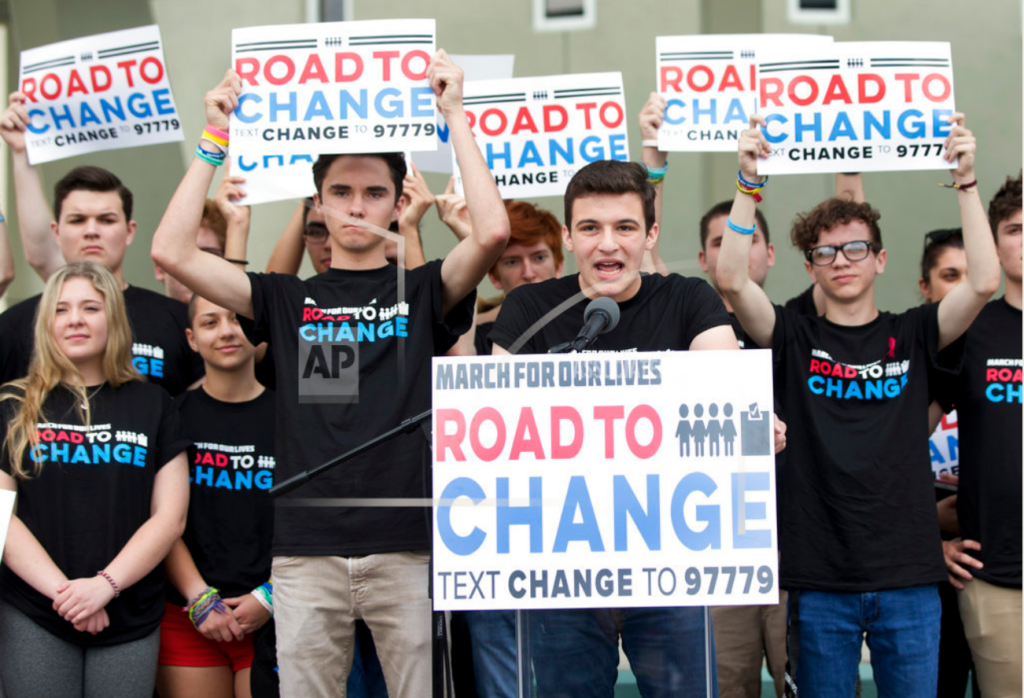
A day after graduating, a group of Florida high school shooting survivors announced they’ll spend their summer crisscrossing the country, expanding their grass-roots activism from rallies and schools walkouts to registering young voters to help accomplish their vision for stricter gun laws. David Hogg, Emma Gonzalez, Cameron Kasky, Jaclyn Corin and about two dozen other students who have become the faces and voices of bloodshed in American classrooms stood together Monday in matching black “Road to Change” T-shirts, holding placards at a park just down the street from Marjory Stoneman Douglas High School where 17 were killed on Valentine’s Day. In the months since the shooting, the students have rallied hundreds of thousands across the country to march for gun reform, including a massive turnout in Washington, D.C., in March. But the young activists say rallies won’t matter unless that energy is funneled into voting out lawmakers beholden to the National Rifle Association this November. “This generation is the generation of students you will be reading about next in the textbooks. … These are students who are changing the game,” Kasky said. “It’s not just my friends and I from Stoneman Douglas High School. We are part of something so much greater. Students from all over the country are beginning to get up, rally, move in the right direction and realize just how important it is to exercise our freedom.” He cited dismal statistics noting voter turnout in the last midterm elections was the lowest since World War II. That’s why the students are planning more than 25 stops in a two-month nationwide tour hitting Iowa, Texas, California, South Carolina, Connecticut and others, targeting communities rocked by gun violence or where lawmakers supported by the NRA are running for office. Kasky said they’re focusing on the 4 million people turning 18 this year. “Voting has so often become a chore to people; people have so often shrugged it off as something that’s not important,” he said. Hogg helped organize a massive voter registration drive last week at 1,000 schools in 46 states. He and other students are advocating for tighter regulations on guns, including universal background checks and training for people who own AR-15s and similar semi-automatic rifles. The students said they are funding the tour through donations but declined to say how much they’ve raised. March For Our Lives received heavy financial and publicity support from celebrities including Oprah Winfrey and George Clooney. They’re also backed by a tightknit, wealthy community where parents and residents have lent them office space and professionals have also been coordinating publicity for them. In addition to the national tour, the students are also planning a separate tour in Florida, targeting every congressional district in the Sunshine State. “We’re working straight through with very minimal breaks because we’re trying to get to as many places as possible, meet as many people as possible,” said Gonzalez, who graduated Sunday. “We’re trying to help stop this before it comes to other places because bullets aren’t picky.” Gonzalez and Corin said their favorite part of activism has been connecting one-on-one with students across the country just like them. Corin recently traveled to Kenya to speak about engaging young activists The tour will begin June 15 in Chicago, where the Florida students will join the Peace March, led by students from St. Sabina Academy. Some of the Chicago students who spoke at the Washington rally and will join the Florida group at a few other stops, Corin said. She said they’re making calls to the student clubs and groups that held their sibling marches and walkouts across the country to encourage voter registration. “Our school is right down the road. Our lives are completely changed forever, and we are dedicating our lives to this issue,” said Corin. Also Monday, a local task force released 100 recommendations for improving school safety, but noted it will be difficult to fund the measures, which include hiring additional school counselors, therapists and school police officers. The Broward County task force also recommended random searches at schools, raising the heights of fences around schools, adding metal detectors and window coverings to conceal students, keeping classroom doors locked at all times and installing cameras to monitor every inch of school grounds. “We would love to be able to put every one of these recommendations into place right now, but the reality is we don’t have all the resources to do that,” said Beam Furr, mayor of the Broward County Board of County Commissioners. Republished with permission from the Associated Press.
Alabama politicians react to Supreme Court gay wedding cake ruling

The U.S. Supreme Court narrowly ruled in favor of a Colorado baker who refused to create a wedding cake for a same-sex couple because of a religious objection. The 7-2 ruling found that the Colorado Civil Rights Commission showed hostility toward the baker, Jack Phillips, based on his religious beliefs. Here’s what Alabama politicians are saying about the decision: Alabama Attorney General Steve Marshall: This Supreme Court Decision should send a strong message to activist courts and bureaucrats alike that Americans’ right to religious expression cannot be trampled and the Constitution cannot be ignored. Alabama 1st District U.S. Rep. Bradley Byrne: This an important victory for religious liberty! It is especially notable that it is a 7 to 2 decision. That means even two of the more liberal justices agreed with the decision. Alabama 4th District U.S. Rep. Robert Aderholt: Today’s ruling by the Supreme Court is one where all Americans should be happy. This is not a time that one side should be seen as a winner and the other side as a loser. This is a win for all Americans who believe that freedom of religion is fundamental. One of the main reasons the first people from Europe came to America was for religious freedom. And that is why protecting religious liberty was one of the founding principles of the Bill of Rights. The Bill of Rights makes the United States unique among nations. Even two of the courts liberal members could not sidestep the First Amendment. This ruling was an important first round victory for religious freedom in an ongoing push-back against modern day political correctness.
Birmingham mayor Randall Woodfin taps Patrick Smith as new police chief
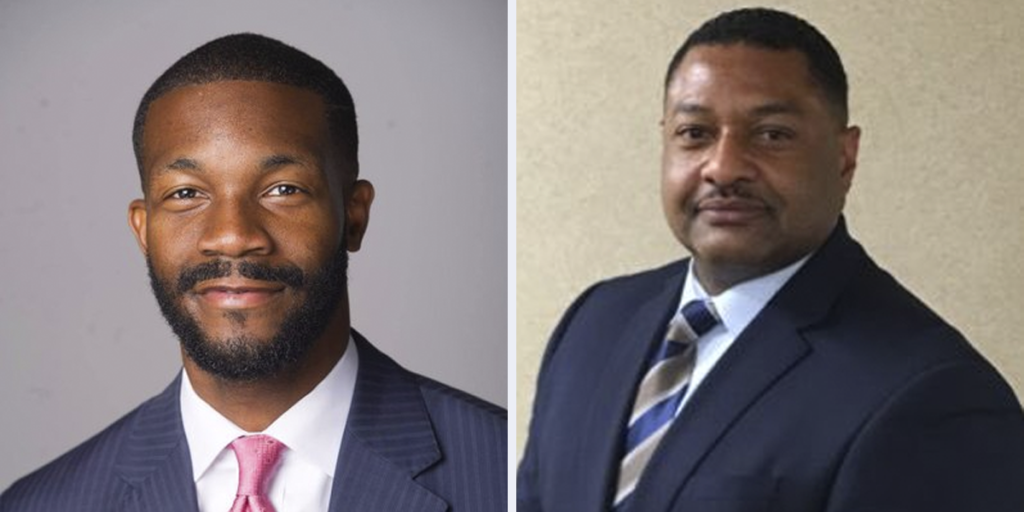
Birmingham Mayor Randall Woodfin named Patrick Smith, a former Commander in the Los Angeles Police Department (LAPD), as the new chief of police for the city during a press conference Monday afternoon. Smith, a Tuscaloosa-native, has more than 27 years law enforcement experience. He began working for the LAPD in 1990 as as officer. He was promoted to Lieutenant in 20017, and in 2010 was promoted to Captain. Most recently in 2015 he was promoted to Commander of the Police Sciences and Training Bureau where he oversaw all aspects of police training for the LAPD from recruit training to in-service training for tenured officers Shortly after the announcement, the Birmingham Police Department tweeted their welcome to the new chief. “Welcome aboard Chief Patrick D. Smith. We look forward to your leadership!” the department tweeted. Welcome aboard Chief Patrick D. Smith. We look forward to your leadership! pic.twitter.com/ScAgdF1SxU — Birmingham Police (@BhamPolice) June 4, 2018 The search for the Magic City’s new police chief began back in February with the city collecting applications from Feb. 1 to March 9. More than 50 candidates – both locally and across the nation – applied for the position. Those applicants were winnowed down to 11 finalists were invited to take part in an assessment process on March 19. There, participants were asked to handle a series of realistic leadership situations. Once those candidates completed the assessment process, a detailed review of their performance was conducted and the three finalists were selected, which Woodfin interviewed himself last month. Shortly State Rep. Allen Treadway, a veteran of the Birmingham Police Department, was named assistant chief. Watch Woodfin’s announcement below:
Here’s everyone the Alabama Trucking Association has endorsed in the 2018 election cycle

The Alabama Trucking Association, through its political action committee, TRUK PAC, has announced its endorsements of candidates who face opposition in the upcoming June 5 primaries. “It’s important that state policymakers understand trucking’s importance and impact to Alabama’s economy,” said ATA President Frank Filgo. “Trucking moves 80 percent of manufactured goods here and provides one out of every 14 Alabama jobs. Our Association believes these candidates, if elected, provide the best opportunity to move this state forward.” According to Filgo, ATA’s 2018 endorsements include 56 primary candidates — almost half of these contenders are running either in opposition to the incumbent or for an open seat. “A high turnover percentage in the State Senate and the House of Representatives is a given,” he adds. Here’s everyone TRUK PAC has endorsed: Statewide races Governor: Kay Ivey*-R Secretary of State: John Merrill*-R Attorney General: Steve Marshall*-R Treasurer: John McMillian-R Alabama Supreme Court Chief Justice: Lyn Stuart*-R Place 1: Brad Mendheim-R Place 4: Jay Mitchell-R Court of Civil Appeals Place 1: Christy Edwards-R Place 2: Terri Thomas*-R State Senate District 2: Tom Butler, R-Huntsville District 4: Garlan Gudger, R-Cullman District 7: Mary Scott Hunter, R-Huntsville District 8: Steve Livingston*, R-Scottsboro District 12: Del Marsh*, R-Anniston District 13: Randy Price, R-Opelika District 21: Gerald Allen*, R-Tuscaloosa District 25: Ronda Walker, R-Montgomery District 26: John Knight, D-Montgomery District 32: Chris Elliott, R-Spanish Fort District 33: Vivian Figures*, D-Mobile District 34: Jack Williams, R-Wilmer State House District 3: Humphrey Lee, R-Sheffield District 4: Parker Moore, R-Decatur District 9 :Scott Stadthagen, R-Hartselle District 10: Mike Ball*, R-Madison District 12: Corey Harbison*, R-Cullman District 13: Connie Rowe*, R-Jasper District 14: Richard “Bull” Corry, R-Oakman District 16: Kyle South*, R-Fayette District 19: Laura Hall*, D-Huntsville District 23: Tommy Hanes*, R-Bryant District 27: Wes Kitchens, R-Arab District 30: Craig Lipscomb, R-Gadsden District 32: Barbara Boyd*, D-Anniston District 33: Ron Johnson*, R-Sylacauga District 38: Debbie Wood, R-Valley District 39: T.J. Maloney, R-Helfin District 42: Jimmy Martin*, R-Clanton District 45: Dickie Drake*, R-Leeds District 48: Jim Carnes*, R-Birmingham District 49: April Weaver*, R-Alabaster District 55: Rod Scott*, D-Fairfield District 59: Mary Moore*, D-Birmingham District 64: Harry Shiver*, R-Bay Minette District 67: Prince Chestnut*, D-Selma District 73: Matt Fridy*, R-Montevallo District 76: Thad McClammy*, D-Montgomery District 82: Pebblin Warren*, D-Tuskegee District 85: Dexter Grimsley*, D-Newville District 87: Jeff Sorrells, R-Hartford District 88: Jeremy Arthur, R-Prattville District 89: Wes Allen, R-Troy District 91: Rhett Marques, R-Enterprise District 97: Adline Clarke*, D-Mobile District 102: Willie Gray, R-Citronelle District 105: Chip Brown, R-Mobile * – Incumbent Candidates
Here’s how the candidates Alabama influencers supported fared in the primaries
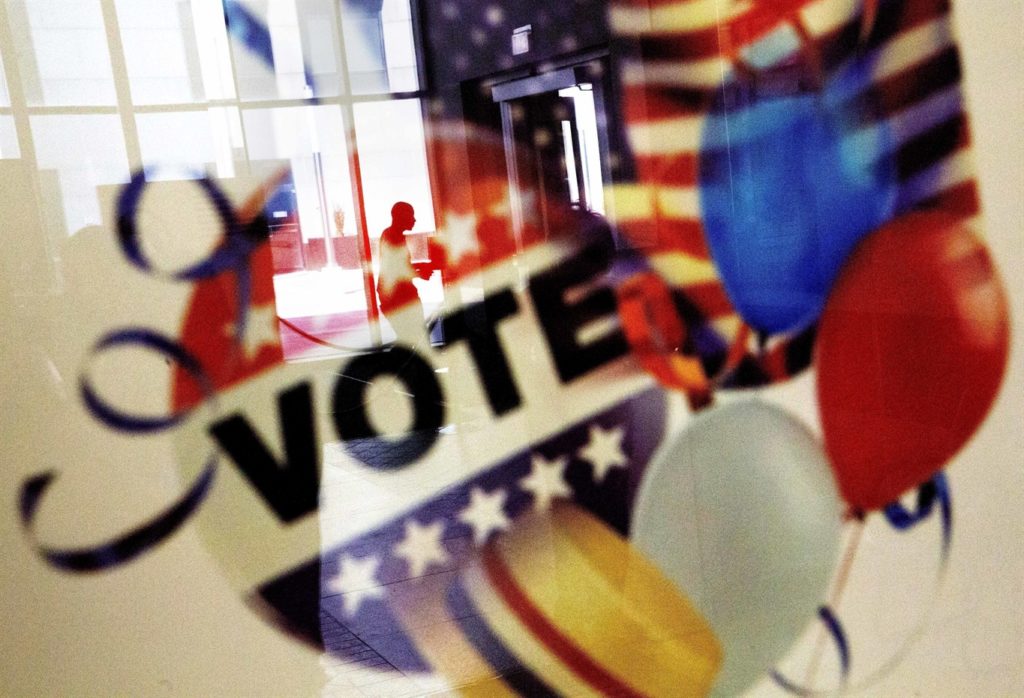
Alabama’s political influencers have a lot of sway when it comes to affecting the decisions of those who follow them. Many influencers represent the voices of particular causes or sections of the population that wouldn’t otherwise be heard. Ahead of the June 5 primary elections, these influencers took time to research the candidates running and made it known to their audience who they were voting for. Here’s who the influencers supported in the June 5 primaries and how the candidates fared: John Rice Governor: Scott Dawson [LOST] Lt Governor: Twinkle Andress Cavanaugh [MOVED TO RUNOFF] Secretary of State: John Merrill [WON] Attorney General: Troy King [MOVED TO RUNOFF] State Treasurer: John McMillan [WON] State Auditor: Jim Zeigler [WON] Commissioner of Agriculture and Industries: Rick Pate [MOVED TO RUNOFF] Alabama Supreme Court Chief Justice: Tom Parker [WON] Supreme Court Place 1: Debra Jones [WON] Supreme Court Place 4: John Bahakel [LOST] Court of Civil Appeals Place 1: Michelle Manley Thomason [MOVED TO RUNOFF] Court of Civil Appeals Place 2: Terry Willingham Thomas [LOST] Court of Criminal Appeals Place 1: Riggs Walker [LOST] Court of Criminal Appeals Place 2: Rich Anderson [MOVED TO RUNOFF] Court of Criminal Appeals Place 3: Bill Cole [WON] PSC Pl 1: Jeremy Oden [WON] PSC Pl 2 Robin Litaker [LOST] Baron Coleman U.S. Congress District 2: Bobby Bright [MOVED TO RUNOFF] Governor: Kay Ivey [WON] Lt. Governor: Twinkle Andress Cavanaugh [MOVED TO RUNOFF] Attorney General: Troy King [MOVED TO RUNOFF] Secretary of State: John Merrill [WON] Treasurer: John McMillan [WON] State Auditor: Stan Cooke [LOST] Commissioner of Agriculture and Industries: Rick Pate [MOVED TO RUNOFF] Alabama Supreme Court Chief Justice: Tom Parker [WON] Supreme Court Place 1: Brad Mendheim [MOVED TO RUNOFF] Supreme Court Place 4: John Bahakel [LOST] Civil Appeals Place 1: Christy Olinger Edwards [MOVED TO RUNOFF] Criminal Appeals Place 2: Rich Anderson [MOVED TO RUNOFF] Rick and Bubba Governor: Scott Dawson [LOST] Common Sense Campaign (TEA Party) Governor: Scott Dawson or Bill Hightower [LOST] Lt. Governor: Rusty Glover [LOST] Attorney General: Alice Martin [LOST] Secretary of State: John Merrill [WON] State Treasurer: David Black State Auditor: Jim Zeigler [WON] Commissioner of Agriculture and Industries: Rick Pate [MOVED TO RUNOFF] Alabama Supreme Court, Chief Justice: Tom Parker [WON] Alabama Supreme Court, Associate Justice Place 1: Debra Jones [LOST] Alabama Supreme Court, Associate Justice Place 4: John Bahakel [LOST] Court of Civil Appeals, Place 1: Michelle Thomason [MOVED TO RUNOFF] Court of Civil Appeals, Place 2: Terri Willingham Thomas [LOST] Court of Criminal Appeals, Place 1: Richard Minor [WON] Court of Criminal Appeals, Place 2: Chris McCool [MOVED TO RUNOFF] Court of Criminal Appeals, Place 3: Bill Cole [WON] PSC, Place 1: Jim Bonner [LOST] PSC, Place 2: Robin Litaker [LOST]
Here’s everyone the Alabama New South Alliance has endorsed in the 2018 election cycle

Hundreds of members from Alabama New South Alliance (ANSA), the political arm of the Alabama New South Coalition (ANSC), has announced its endorsements of races across the state ahead of the June 5 primary. According to their website, the purpose of the Alabama New South Coalition is to promote the general welfare of all people through independent focused organizations dedicated to progressive ideals of freedom, justice and democracy. Our specific objectives are to effect solutions to social, economic and community problems by constructively promoting: Community focused organization Voter registration and education Economic development Cultural awareness Leadership development Youth development Progressive legislation and; to coalesce and assist organizations with similar objectives. ANSA members gathered Saturday, April 21 at the Maggie Street Dream Center in Montgomery, Ala. for their Spring Endorsement Convention. After hearing from statewide, congressional, legislative, and multi-county candidates, ANSA made their endorsements for the June 5 primary election. Here are the candidates who the Alabama New South Alliance has endorsed, who they believe will best promote “progressive” ideals and legislation while in office: U.S. Congress District 1: Robert Kennedy, Jr. District 2: Tabitha Isner and Audri Scott Williams (dual endorsement) District 4: Lee Auman Statewide races Governor: Walt Maddox Attorney General: Joseph Siegelman Alabama Supreme Court Chief Justice: Bob Vance Associate Justice Place 3: Will Sellers Associate Justice Place 4: Donna Wesson Smalley State Senate District 23: Malika Sanders-Fortier State House District 69: Kevin Lawrence State Board of Education District 8: Jessica Fortune Barker State Democratic Executive Committee 70: Eva Prewitt 71: John Zippert Additionally, the Third District of Alabama New South Alliance met on Saturday, May 5 at the Ebenezer CME Church in Loachapoka, Ala. as a continuation of the Third District meeting at the ANSA convention held on Saturday, April 21 in Montgomery, Ala. There, they made the following endorsements. U.S. Congress District 3: Mallory Hagan State Senate District 13: Darrell Turner State House District 32: Barbara Boyd District 38: Brian McGee District 82: Johnny Ford District 83: John Andrew Harris Board of Education District 2: Adam Jortner State Democratic Executive Committee Patsy-Boyd Parker
Primary election day: here’s what to know before you head to the polls

Big decisions will be made Tuesday as Alabamians statewide head to the polls to cast their ballots in the Democratic and Republican primaries. Voters will have from 7 a.m. – 7 p.m. to choose between candidates is races across the state. Here’s what you need to know before you head to the polls: Valid ID A voter can use any of the following forms of photo ID at the polls: Valid driver’s license Valid non-driver ID Valid Alabama photo voter ID Valid state issued ID (Alabama or any other state) Valid federal issued ID Valid US passport Valid employee ID from federal government, State of Alabama, county government, municipality, board, authority, or other entity of this state Valid student or employee ID from a college or university in the State of Alabama (including postgraduate technical or professional schools) Valid military ID Valid tribal ID If you do not have a valid photo ID you may vote only if you are identified by two election officials in the polling place as a voter on the poll list who is eligible to vote and the election officials execute an affidavit stating this. If you do not have a valid photo ID and the election officials are not able to identify you, you must cast a provisional ballot. Polling place Not sure where you vote? You can find your polling place online here by simply entering in the address from which you registered to vote. Sample ballots Your ballot is based on your county and its associated political districts such as School Board, State Legislative Districts, and U.S. Congressional District. You may view the sample ballot for your county here. Candidate profiles. Throughout the election cycle Alabama Today invited all candidates running for office in Alabama this year to complete a questionnaire we believe offers an interesting, albeit, thumbnail sketch of who they are and why they are running. Here are the responses we’ve gotten thus far. Primary procedure Primary elections are held by the political parties to select each party’s nominee for the general election. In the primary, separate party ballots are printed, and the voter must choose between the ballot with Democrats running against other Democrats or the one on which Republicans run against other Republicans. If there are three or more candidates in a race, and if no one receives a majority of the votes cast, then a second primary election or runoff election is held between the two candidates who receive the highest number of votes in the first primary. The winner of this runoff election will be the party nominee. Split ticket voting and the cross-over ban Split-ticket voting is prohibited during the primary and primary runoff phase of the election cycle. Additionally, whatever party a voter chooses to vote with in the primary, they cannot change it in any runoff elections. The ban, signed into law by Governor Kay Ivey last year, “helps the Democrats choose Democratic candidates, it helps the Republicans choose Republican candidates. It just prevents the cross-over voting so you get a pure general election with a Democrat and a Republican,” Auburn-Republican Sen. Tom Whatley told AL.com, last May. Write-in votes Because primary and primary runoff elections are political party functions, a voter may choose only among those names the political parties place on their ballots. Therefore, the voter may not write-in a vote in a primary or primary runoff election. Voter fraud If you experience any issues at the polling place contact the Statewide Elections & Voter Fraud Hotline: 1-800-274-VOTE (8683).
AG’s office responds to Sherry Lewis’s request for dismissal of ethics charges

Birmingham Water Works Board (BWWB) of Directors member Sherry Lewis filed a request to dismiss her ethics violation charges in April, saying the state’s case against her had no real substance as it did not contain specific dates for her infractions. Lewis’s motion also included language saying she was not informed of any specific conduct for which she had disobeyed the law, and failed to inform her, and her codefendants Jerry Jones and Terry Williams, “‘of the nature and cause of the accusation’ against her and subjects her to being ‘twice put in jeopardy’” making the original claim against her unconstitutional. The Alabama Attorney General’s office responded to Lewis’s request this weekend by denying it. They said the evidence against her is sufficient, and her concerns about “double jeopardy” are premature. Lewis, Williams and Jones were indicted for several violations of state ethics laws in December of 2017. The original claim the state made against Lewis said she used her “official position or office to obtain personal gain for herself, a family member, or a business with which she is associated, and such use and gain were not otherwise specifically authorized by law.” She argues in her request for dismissal that the state used language from an Alabama law, not specifics for which she was indicted. But the state’s response to Lewis’s request for dismissal tells a different story, which describes that Lewis unlawfully used her influence on the board to obtain “money, a no-show job for a family member, and free meals and other improper benefits.” The response continues to say Lewis got those things from two people: “Defendant Jerry Jones, a former Vice President of Arcadis U.S. Inc., and Defendant Terry Williams, an Arcadis subcontractor. Jones was the manager of the BWWB account with Arcadis and he ostensibly hired Williams and his company, Global Solutions, LLC, to work on BWWB projects.” Arcadis has made millions of dollars advising and working on technical issues for the BWWB, and Jones, as Arcadis’s account manager for the BWWB contract, earned more than $300,000 per year for his his client-management services. Asking for specifics on her charges, Lewis got them. The state’s response to Lewis continued to say that Jones and Williams provided Lewis’s son, Joseph Lewis, with a no-show job with Williams’s company. Joseph Lewis received more than $25,000 from the company and would regularly deposit money into his mother’s account, often the same day Williams paid him. “Additionally, when Lewis traveled for BWWB business, Jones often paid the bill,” said the state’s response. “On numerous occasions, Jones filed false expense reports and reimbursement requests with Arcadis about meals that Jones bought for Lewis or her family. For her part, Lewis concealed that her sixty-plus votes for Arcadis benefited her financially and that her refusal to consider other engineering firms for public work had a personal motivation. By prioritizing personal financial gain over honest government, the Defendants violated the Alabama Ethics Act,” the report continues. Lewis and her attorney’s refuse to admit to these charges, and is “looking forward to her day in court to confront the prosecutions accusations,” according to WBRC. If found guilty of the charges, Lewis, Jones and Williams all face $30,000 each in fines, and a maximum sentence of 20 years in prison. You can read the full text of Lewis’s request and the state’s response below: Lewis’s Motion to dismiss: Sherry Lewis Motion to Dismiss by Jenna Anderton on Scribd State’s Response: Alabama Attorney General’s Office Response to Sherry Lewis Motion to Dismiss by Jenna Anderton on Scribd
Immigration fight, tension on tariffs await Congress’ return
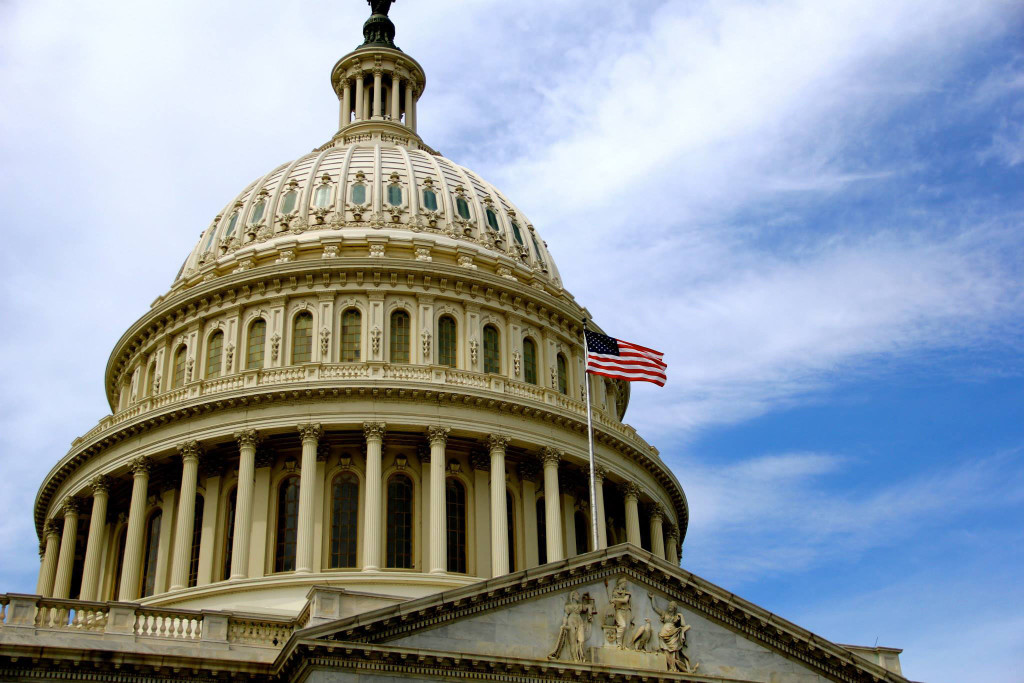
This was supposed to be the quiet time on Capitol Hill, but Congress returns to work Monday facing a showdown in the House over immigration while Senate Republicans are trying to stop an all-out trade war after President Donald Trump’s decision to impose import tariffs on close U.S. allies. Tensions are running particularly high as Senate Majority Leader Mitch McConnell is threatening to cancel the traditional August recess as he fights Democratic opposition to GOP priorities in a show of busy-work before the midterm election. It’s shaping up to be far from the typical summer slowdown when legislating usually makes way for campaigning. “Another summer, another heavy work load,” tweeted Sen. Chuck Grassley, R-Iowa, as he pushed to confirm nominations. “NOW is the time to vote on Fridays (even wknds!).” The Senate often is not in session on Fridays. Congress faces a few should-do items in the weeks ahead. Topping the agenda is passage of the annual defense bill, which includes pay raises for the troops. It has already cleared the House. The Senate could begin consideration of its defense bill this week. But the Senate version carries a warning to Trump with a trade provision to block any White House plan to lift penalties on the China-based telecommunications company ZTE, which faces trade law violations over selling sensitive technologies to U.S. adversaries. Trump’s moves on trade are expected to consume conversations among Senate Republicans this week. They’re worried about a wider trade war spiking prices for home-state businesses and consumers if Trump imposes steel and aluminum tariffs, as planned, on imports from Canada, Mexico and the European Union. Republicans will be making the case to the administration that the tariffs could dampen the economic gains from the GOP tax cuts and sour the mood among voters as lawmakers are campaigning to protect the Republican majority in Congress. Some Republicans are also hoping Trump simply changes his mind and doesn’t follow through with it. But aides said others may be signing on to a bill from Sen. Mike Lee, R-Utah, that would subject all trade actions by the executive branch, including tariffs, to congressional approval. Rep. Will Hurd, R-Texas, said he would support a similar move in the House. “Congress has shared our responsibility when it comes to trade with the executive branch over the last couple of decades, and I think that’s something that we need to re-evaluate,” he told CBS’ “Face the Nation.” Meanwhile, House Republicans face a self-imposed deadline Thursday for resolving an immigration standoff between GOP centrists who are forcing a vote on legislation to protect young immigrants who were brought to the country illegally as children and conservatives who want stricter immigration enforcement with money for Trump’s border wall. The centrists want to provide a way for the young immigrants to become permanent residents, which can lead to citizenship. Conservatives are opposed to creating a new pathway to staying in the U.S. permanently, equating it with granting amnesty to lawbreakers. Speaker Paul Ryan, R-Wis., and Majority Leader Kevin McCarthy, R-Calif., are trying to craft a Republican-led bill as a compromise between the factions, but it’s difficult. House leaders plan a two-hour private meeting of GOP lawmakers Thursday morning to hash out whether talks among the party’s factions have produced an immigration compromise that can win broad support. Underscoring the sensitivity of the session, staff is to be excluded. They’re trying to prevent the moderates from joining with Democrats to pass the “Dreamer” protections, which polls suggest are popular, but which would be a setback for GOP leaders and expose the majority to complaints from the conservative base. Without a deal, the moderates say they’ll push ahead with enough signatures on a so-called discharge petition to force the vote over the leadership’s objections. Hurd said moderates have the votes already, but are “engaged in conversations to figure out … is there another path. I don’t believe that there is.” Rep. Carlos Curbelo, R-Fla., said in an interview last week that he saw a 50-50 chance of those talks succeeding. He warned that if they didn’t bear fruit, he and his supporters “fully expect” to continue pushing their petition. Curbelo said the young immigrants must “be guaranteed a future in our country, meaning they cannot be exposed to deportation.” He said, “They must have permanent status immediately and they must have the option of a bridge into the legal immigration system,” meaning a pathway to citizenship. The moderates’ effort has won the backing of GOP Sen. John McCain, fighting brain cancer back home in Arizona, who tweeted on Saturday: “Congress can’t ignore this critical issue — and the many lives it impacts — any longer.” Starting Monday in the Senate, McConnell has teed up votes on three nominees to serve as federal district court judges, including the first Hispanic lawyer whom Trump nominated for the bench, Fernando Rodriguez Jr. of Texas. The selections are expected to receive bipartisan support, though more contentious votes are expected in coming weeks. Republicans have made it a top priority to get Trump’s nominees on the bench, to the alarm of Democrats, who say Republicans are working to stack the federal judiciary with young ideologues who will shape it for decades to come. Republished with the permission of the Associated Press.
Alabama school superintendent makes headlines asking for donations in exchange for early release
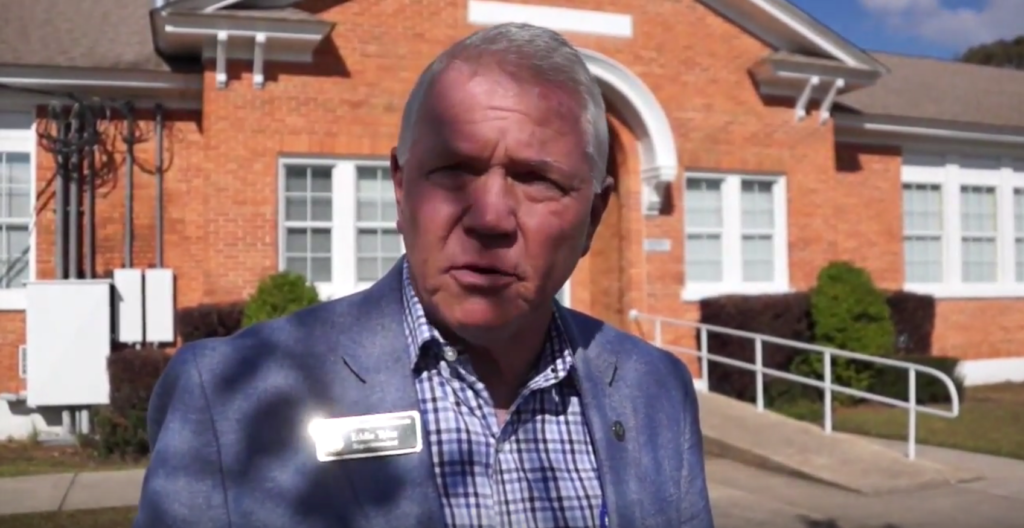
Eddie Tyler Superintendent of Baldwin County Public Schools has made headlines for a series of emails he sent last year to teachers and staff soliciting charity donations, and incentivizing contributions with early release from school. A series of Nov. 2017 emails were obtained by the Independent Press Journal (IPJ) from a source within Baldwin County Public Schools who wishes to remain anonymous. The emails were sent from Baldwin County Board of Education (BCBE) to all teachers and staff within their school district. According to IPJ, the emails begin with Executive Director of the United Way of Baldwin County, Inc. (UWBC) Marina Simpson pressing Tyler for more donations. On Nov. 27, Simpson said: “Unfortunately, the campaign dropped this year to 78,448.92… this number includes a combination payroll deduction, one-time donations made by BCBE employees, and any student campaigns that were held (we only have a few schools that do student campaigns).” Two days later, Tyler emailed all teachers and staff within the Baldwin County school district requesting donations to the UWBC, all the while incentivizing donations with early release from school: “we value our continuing partnership with Marina Simpson …. If our contributions meet or exceed $90K, the system will release students at 11:30 and ALL teachers at 1:00 the Friday before Christmas holidays 12/15/2017. If we as a system reach or exceed $100K, we will have a second early release day the Friday before Mardi Gras.” Tyler requested donations again on Dec. 6. “Time is running out. To make a decision about the early release, giving will be tallied at the end of the school day this coming Friday.” Tyler’s quid pro quo requests are nothing new While news of Tyler’s requests have just surfaced, he’s apparently made a practice of collecting funds on behalf of the UWBC and “rewarding” schools with early release for years. A youtube video from Nov. 2016 shows Tyler introducing Simpson who announced the school system has reached their goal of $75,000 donations, and thus have been “awarded” early release. Ethical issues According to IPJ, many Baldwin County teachers feel pressured to give, or else risk their reputation. A teacher told IPJ that BCBE officials place pledge cards and donation information in their mailboxes, and if staff don’t fill it out, then they are treated differently. “We’re pressured until we finally just do it to get them off our backs,” said a teacher. Sources also report that when teachers have not donated or filled-out their pledge cards for UWBC in the past, school officials have allowed a UWBC representative named Lana Mummah to come into the school and talk those teachers into donating. Lana Mummah is married to Ken Mummah, who is a former BCBE official. The Alabama State Department of Education (ALSDE) has yet to respond to Alabama Today’s request for comment.
Supreme Court gives victory to baker who refused to make cake for gay wedding

The U.S. Supreme Court narrowly ruled in favor of a Colorado baker who refused to create a wedding cake for a same-sex couple because of a religious objection. The 7-2 ruling found that the Colorado Civil Rights Commission showed hostility toward the baker, Jack Phillips, based on his religious beliefs. Justice Anthony M. Kennedy, writing for the majority, said the state commission had violated the Constitution’s protection of religious freedom in ruling against Phillips. “The neutral and respectful consideration to which Phillips was entitled was compromised here,” penned Justice Kennedy. “The Civil Rights Commission’s treatment of his case has some elements of a clear and impermissible hostility toward the sincere religious beliefs that motivated his objection.” Justices Ruth Bader Ginsberg and Sonia Sotomayor dissented. This story is breaking and will be updated.
The end of an era? Tea party class of House Republicans fades
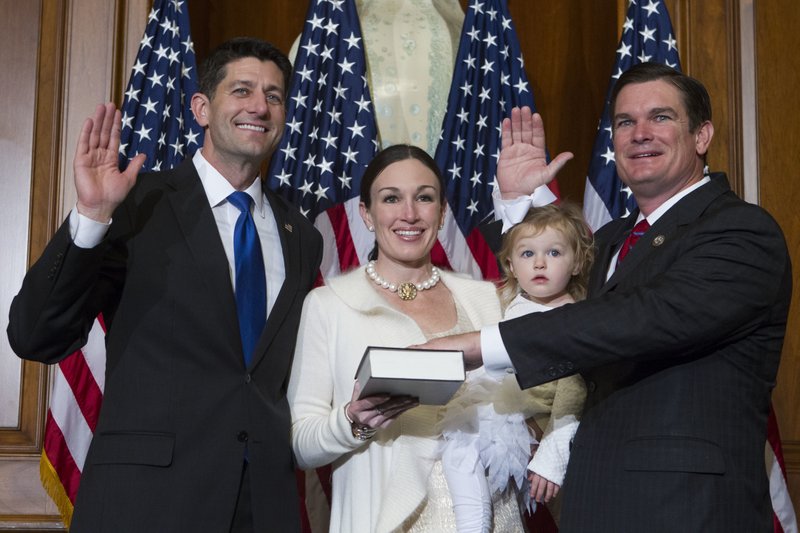
The Republican newcomers stunned Washington back in 2010 when they seized the House majority with bold promises to cut taxes and spending and to roll back what many viewed as Barack Obama’s presidential overreach. But don’t call them tea party Republicans any more. Eight years later, the House Tea Party Caucus is long gone. So, too, are almost half the 87 new House Republicans elected in the biggest GOP wave since the 1920s. Some, including current Secretary of State Mike Pompeo and White House budget director Mick Mulvaney, joined the executive branch. Others slipped back to private life. Several are senators. Now, with control of the House again at stake this fall and just three dozen of them seeking re-election, the tea party revolt shows the limits of riding a campaign wave into the reality of governing. Rep. Austin Scott, R-Ga., who was president of that freshman class, objects to the tea party brand that he says was slapped on the group by the media and the Obama administration. It’s a label some lawmakers now would rather forget. “We weren’t who you all said we were,” Scott said. He prefers to call it the class of “small-business owners” or those who wanted to “stop the growth of the federal government.” Despite all those yellow “Don’t Tread on Me” flags and anti-Obama health law rallies, Scott said the new Republican lawmakers wanted to work with the president, if only Obama would have engaged them. “We didn’t come to take over the country,” he said. Yet change Washington they did, with a hard-charging, often unruly governing style that bucked convention, toppled GOP leaders and in many ways set the stage for the rise of Donald Trump. By some measures, the tea party Republicans have been successful. The “Pledge to America,” a 21-page manifesto drafted by House Republican leadership, outlined the promises. Among them: “stop out of control spending,” ″reform Congress” and “end economic uncertainty.” They forced Congress into making drastic spending cuts, in part by threatening to default on the nation’s debt, turning a once-routine vote to raise the U.S. borrowing limit into a cudgel during the annual budget fights. Republicans halted environmental, consumer and workplace protection rules, and that rollback continues today. Perhaps most notably, the GOP majority passed $1.5 trillion in tax cuts that Trump signed into law, delivering on the tea party slogan penned on so many protest signs: “Taxed Enough Already.” But former Rep. Tim Huelskamp, R-Kan., said the “most egregious failure” was the GOP’s inability to undo the Affordable Care Act, Obama’s signature domestic achievement. Huelskamp said the class never really stuck together. When he arrived that first week in Washington in January 2011, he was stunned to find the leadership slate already set with then-Rep. John Boehner, R-Ohio, as speaker-in-waiting, facing little resistance. “That was a sign: The establishment in Washington was happy to have our votes, but not to follow our agenda,” said Huelskamp, who lost a primary election in 2016 to a political newcomer and now runs the conservative Heartland Institute. It was “just a clear misunderstanding of what the people wanted.” Over time, budget deals were struck with Democrats, boosting spending back to almost what it was before the revolt. Combined with the tax package, the GOP-led Congress is on track to push annual deficits near $1 trillion next year, as high as during the early years of the Obama administration when the government struggled with a deep recession. Maya MacGuineas, president at the Committee for a Responsible Federal Budget, said Republicans talked a good game promising to balance the budget, but with control of Congress — and now the White House — they failed to tackle the tough tax-and-spending challenges needed to get there. “That’s a whole lot of talk and zero follow through,” she said. Other proposals to improve transparency in government — a pledge to “read the bill” and post legislation three days before votes — remain works in progress. House bills are typically made public, but sometimes just before midnight to conform with the three-day rule. Frustrations within the ranks grew, and the new class splintered. Not all of them had been favorites of their local tea party groups. Some joined other conservatives to form the House Freedom Caucus, which nudged Boehner to early retirement in 2015. Former Florida Rep. Allen West, among the more prominent class members who lost re-election and is now a Fox News contributor living in Texas, said the challenge for House Republicans heading into the fall election is, “Who are they? What do they stand for?” House Republicans are wrestling with a midterm message at a pivotal moment for a party that Boehner says no longer exists. “There is no Republican Party. There’s Trump’s party,” Boehner said at a recent policy conference in Michigan. Boehner’s successor as speaker, Rep. Paul Ryan, R-Wis., also is stepping aside. He was a conservative up-and-comer long before the tea party, but has run into many of the same challenges Boehner faced in managing a fractured majority. He will retire after this term. In fact, there are an unusually high number of House Republicans retiring this year, including nearly a dozen from the tea party class. Several are running to be governors or senators, though some have already lost in primaries. Others, including Rep. Trey Gowdy, R-S.C., another rising star, are simply moving on. Some resigned this year amid ethics scandals. Jenny Beth Martin, a co-founder of Tea Party Patriots, says every movement “goes through phases.” As the group looks to elect the next “Tea Party 100″ members of the House, it’s seeking “tested and proven” candidates beyond the “citizen legislators” who powered the early days. Another 2010 leader, South Carolina’s Tim Scott, now a senator, says he has no problem with the tea party label that’s now etched in history. But he reminds his colleagues as they campaign that to keep the majority they must also eventually govern and that “promises made should be promises kept.” Republished


